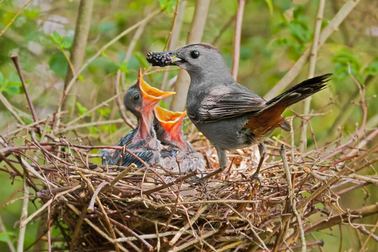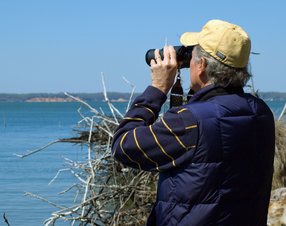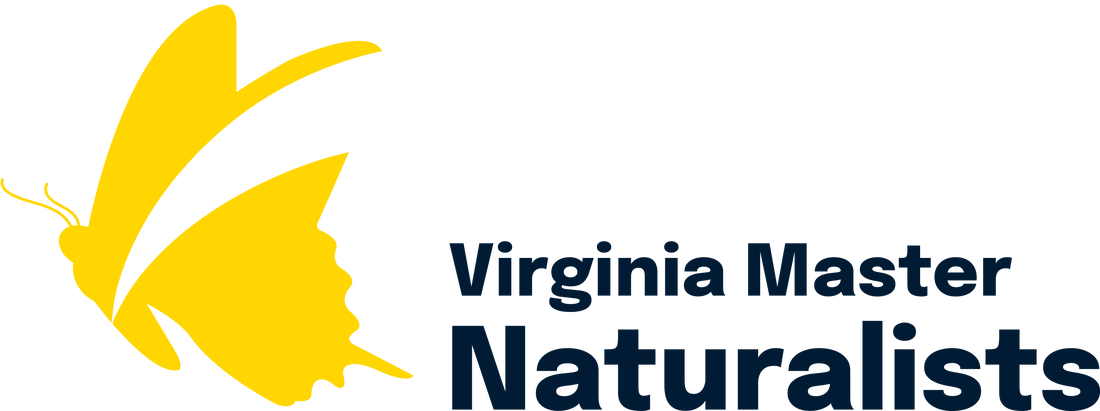 Gray Catbird nest. Image by Bob Schamerhorn, provided by VABBA2.
Gray Catbird nest. Image by Bob Schamerhorn, provided by VABBA2. By Ashley Peele, Virginia Breeding Bird Atlas 2 Coordinator
Spring is in sight and season two of the second Virginia Breeding Bird Atlas (VABBA2) is about to launch! In preparing for season two, we’d like to look back at what we learned and accomplished in season one, 2016. First, Virginia is an incredible place to survey birds. Between the mountains and valleys, the rolling Piedmont, and the rich Coastal Plain, Atlas volunteers identified over 205 species of birds and confirmed 174 of those species are currently breeding. They reported over 684,000 birds to the project! (For more details, check out our Season One Summary at http://amjv.org/resources_vabba2/Season2016Summary_Final.pdf.)
Interestingly, most of the data received this year comes from areas where the most people live. This makes sense! We tend to bird the areas closest to home first. However, this year we’re asking volunteers to begin looking at blocks a little further from home. You often don't have to look far outside your community to find where the Atlas coverage drop away. There are so many awesome breeding records just waiting to be confirmed in the rural Piedmont or out in the mountains or even in your own neighborhood, so please consider field excursions to those areas.
The second remarkable thing about this first season is the volunteer birder community, including many Virginia Master Naturalists, who pitched in from all over Virginia. By the end of the summer, over 450 volunteers contributed to the Atlas project.
Spring is in sight and season two of the second Virginia Breeding Bird Atlas (VABBA2) is about to launch! In preparing for season two, we’d like to look back at what we learned and accomplished in season one, 2016. First, Virginia is an incredible place to survey birds. Between the mountains and valleys, the rolling Piedmont, and the rich Coastal Plain, Atlas volunteers identified over 205 species of birds and confirmed 174 of those species are currently breeding. They reported over 684,000 birds to the project! (For more details, check out our Season One Summary at http://amjv.org/resources_vabba2/Season2016Summary_Final.pdf.)
Interestingly, most of the data received this year comes from areas where the most people live. This makes sense! We tend to bird the areas closest to home first. However, this year we’re asking volunteers to begin looking at blocks a little further from home. You often don't have to look far outside your community to find where the Atlas coverage drop away. There are so many awesome breeding records just waiting to be confirmed in the rural Piedmont or out in the mountains or even in your own neighborhood, so please consider field excursions to those areas.
The second remarkable thing about this first season is the volunteer birder community, including many Virginia Master Naturalists, who pitched in from all over Virginia. By the end of the summer, over 450 volunteers contributed to the Atlas project.
 Observing waterfowl at Belle Isle State Park. Image by VMN-Northern Neck Chapter.
Observing waterfowl at Belle Isle State Park. Image by VMN-Northern Neck Chapter. Many volunteers are still new birders and learning much as they go along. In fact, everyone involved (myself included) had some learning curves. However, Atlasers collectively demonstrated that learning these new tools is doable and worthwhile. The energy and willingness to learn demonstrated by many VMNs has set a great example for other volunteers. We thank them for all they’ve done to contribute and promote birding for conservation with the VABBA2.
Exciting new project updates are on the horizon for our next field season. Cornell has now upgraded eBird mobile and volunteers can enter all field observations for the Atlas (including breeding codes!) with their smartphone! Additionally, the VABBA2 project will be putting on a series of training workshops around the state this spring.
Current dates include:
Follow us at Facebook.com/vabba2 and check out our eBird portal at ebird.org/atlasva.
Exciting new project updates are on the horizon for our next field season. Cornell has now upgraded eBird mobile and volunteers can enter all field observations for the Atlas (including breeding codes!) with their smartphone! Additionally, the VABBA2 project will be putting on a series of training workshops around the state this spring.
Current dates include:
- Central Training Workshop at Ivy Creek Nature Preserve, Charlottesville on March 25.
- Northern Training Workshop at Frying Pan Farm Park, Fairfax County, on April 1.
- Eastern Training Workshop at VSO Annual Meeting in Richmond, May 6.
- Western Training Workshop – Date and time are TBD.
Follow us at Facebook.com/vabba2 and check out our eBird portal at ebird.org/atlasva.


 RSS Feed
RSS Feed